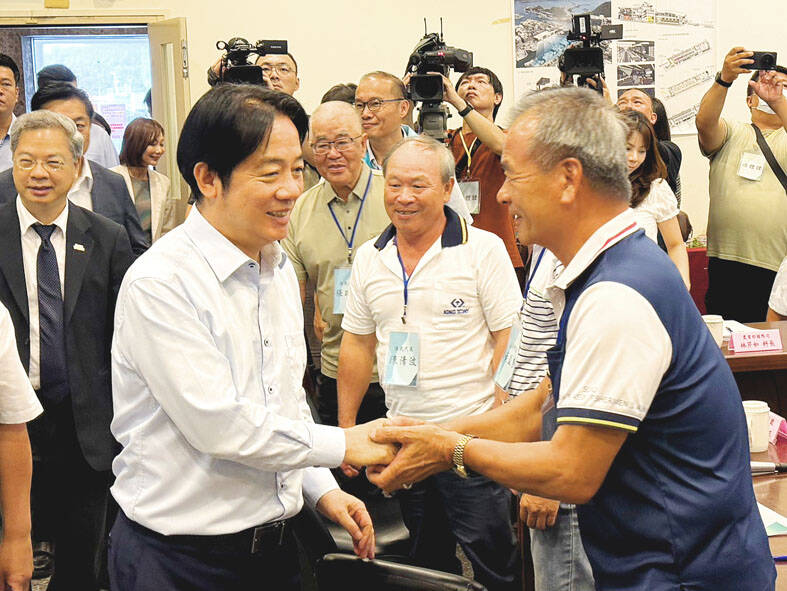President William Lai (賴清德) on Friday visited Yilan County’s Suao Township (蘇澳) to inspect the mahi-mahi industry and meet with fisheries operators affected by the new 20 percent US tariff, pledging that the government would support fisherfolk and farmers through the impact.
The tariff, which took effect this month, is double the 10 percent rate imposed on most Latin American nations — Taiwan’s main competitors in the US mahi-mahi market — raising concerns that Taiwan could lose ground in its largest export destination.
Lai toured a local mahi-mahi processing plant with Minister of Agriculture Chen Junne-jih (陳駿季) and Cabinet Secretary-General Kung Ming-hsin (龔明鑫), before holding a meeting with fisheries representatives.

Photo: Wang Chun-chi, Taipei Times
He said that government measures to counter tariff hikes cover not only the technology sector, and small and medium-sized businesses, but also fisheries and agriculture.
Yilan County is a critical hub for mahi-mahi production and processing, Lai said, adding that he came in person to listen to fishers’ concerns.
Taiwan Mahi-Mahi Fishery Association managing supervisor Chen Chun-ming (陳俊銘) said mahi-mahi are mainly caught around Yilan County’s Nanfangao Fishing Port, Taitung County’s Chenggong Fishing Port and Pingtung County’s Donggang Township (東港).
Taiwan produces more than 5,000 tonnes annually, with about 70 percent exported to the US, he said, urging the government to expand domestic demand by promoting mahi-mahi in school lunches and military meals.
Association chairman and Suao Fishermen’s Association secretary-general Chen Chun-sheng (陳春生) said that exports to the US are positioned as high-end products, adding that the impact of the tariff could be eased if the government helps improve the industry’s competitiveness.
The Ministry of Agriculture on Friday said that NT$18 billion (US$589 million) has been allocated to support the sector through subsidized agricultural loan interest, the procurement of fishing boats and cold chain transport equipment, and the maintenance of cold storage facilities.
To boost demand, the ministry said it would also provide incentives for mahi-mahi marketing campaigns, including by offering up to NT$2 million for nationwide promotions, NT$1 million for local events and up to NT$200,000 for other approved marketing activities.

The manufacture of the remaining 28 M1A2T Abrams tanks Taiwan purchased from the US has recently been completed, and they are expected to be delivered within the next one to two months, a source said yesterday. The Ministry of National Defense is arranging cargo ships to transport the tanks to Taiwan as soon as possible, said the source, who is familiar with the matter. The estimated arrival time ranges from late this month to early next month, the source said. The 28 Abrams tanks make up the third and final batch of a total of 108 tanks, valued at about NT$40.5 billion

Two Taiwanese prosecutors were questioned by Chinese security personnel at their hotel during a trip to China’s Henan Province this month, the Mainland Affairs Council (MAC) said yesterday. The officers had personal information on the prosecutors, including “when they were assigned to their posts, their work locations and job titles,” MAC Deputy Minister and spokesman Liang Wen-chieh (梁文傑) said. On top of asking about their agencies and positions, the officers also questioned the prosecutors about the Cross-Strait Joint Crime-Fighting and Judicial Mutual Assistance Agreement, a pact that serves as the framework for Taiwan-China cooperation on combating crime and providing judicial assistance, Liang

A group from the Taiwanese Designers in Australia association yesterday represented Taiwan at the Midsumma Pride March in Melbourne. The march, held in the St. Kilda suburb, is the city’s largest LGBTQIA+ parade and the flagship event of the annual Midsumma Festival. It attracted more than 45,000 spectators who supported the 400 groups and 10,000 marchers that participated this year, the association said. Taiwanese Designers said they organized a team to march for Taiwan this year, joining politicians, government agencies, professionals and community organizations in showing support for LGBTQIA+ people and diverse communities. As the first country in Asia to legalize same-sex

MOTIVES QUESTIONED The PLA considers Xi’s policies toward Taiwan to be driven by personal considerations rather than military assessment, the Epoch Times reports Chinese President Xi Jinping’s (習近平) latest purge of the Chinese People’s Liberation Army (PLA) leadership might have been prompted by the military’s opposition to plans of invading Taiwan, the Epoch Times said. The Chinese military opposes waging war against Taiwan by a large consensus, putting it at odds with Xi’s vision, the Falun Gong-affiliated daily said in a report on Thursday, citing anonymous sources with insight into the PLA’s inner workings. The opposition is not the opinion of a few generals, but a widely shared view among the PLA cadre, the Epoch Times cited them as saying. “Chinese forces know full well that